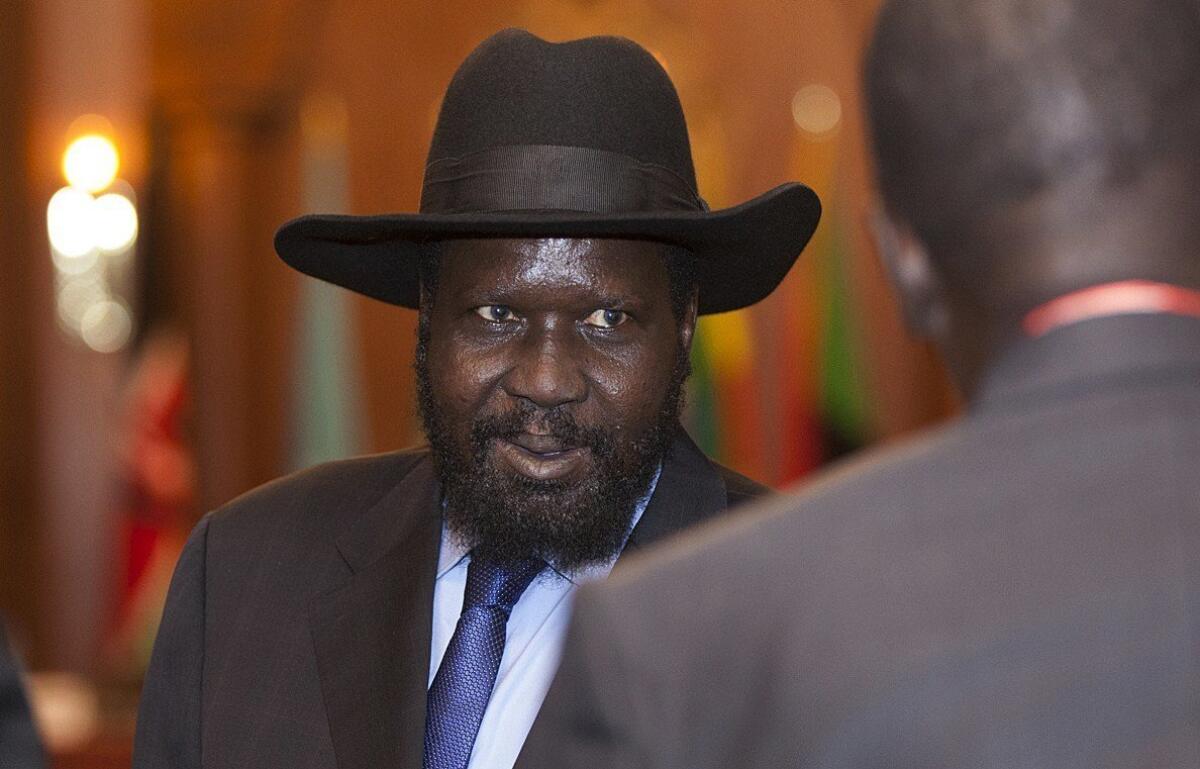South Sudan’s rival leaders sign power-sharing deal

After more than a year of fighting that nearly split the world’s newest country, leaders of South Sudan’s fractured ruling party agreed Monday to form a transitional government.
The deal, which also reaffirms a cease-fire reached last month, is the latest of several the sides have reached, with the previous ones soon broken. But the parties said they were committed to reaching specifics of the new power-sharing government by March 5.
Such a outcome would return the country to where it was before the governing Sudan People’s Liberation Movement split acrimoniously in 2013: with two sides who deeply mistrust one another sharing power.
Under a proposed deal, President Salva Kiir would remain in office while his rival, Riek Machar, the leader of a rebel faction, would return to his former position as Kiir’s deputy. The transitional government would remain in place for 30 months, after a three-month pre-transitional period, according to an initialed copy of the agreement posted online by the Sudan Tribune.
If the parties manage to reach a final agreement by the March 5 deadline, elections that had been planned for June would be delayed. The rebel faction had strongly opposed the government’s plan to go ahead with balloting.
The power-sharing government would begin its term by July 9.
South Sudan gained independence from Sudan in 2011 after two decades of civil war and a referendum on secession. But infighting in the government led to ethnic killings in many parts of the country in December 2013, with thousands of civilians killed. Both sides have been accused of crimes against humanity by rights groups.
An estimated 1.8 million people fled their homes as fighting spread across the country. Civilians were shot or hacked to pieces and houses were burned down. More than 112,000 civilians are still sheltering at United Nations peacekeeping bases, terrified to return to their homes, according to a U.N. report over the weekend.
The first cease-fire, signed in January 2014, fell apart almost immediately, as did successive agreements. Delegations from the two sides met in Addis Ababa, the Ethiopian capital, during a drawn-out peace process, financed by the European Union at a cost of $22 million, the Agence France-Presse news service reported.
A rebel spokesman said many details in the power-sharing government still had to be worked out.
“There are, however, many issues pending for further negotiations before a final peace agreement,” rebel spokesman James Gatdet Dak, told Sudan Tribune on Monday.
The peace process was led by the Intergovernmental Authority on Development (IGAD), the East African leadership bloc involving eight countries, including South Sudan and Sudan.
If the parties overcome their antipathy and peace talks don’t collapse due to infighting over positions in the new government, it’s hoped the deal will stop the killing and allow refugees to return home.
The agreement provides for the establishment of a commission for truth, reconciliation and healing, to investigate human rights abuses during the conflict. Eminent Africans would assist in the process, which would aim to record victims’ experiences and facilitate reconciliation.
An independent hybrid judicial body would be set up, with input from judges and lawyers from South Sudanese and other African countries, to prosecute those with the greatest responsibility for atrocities, according to the preliminary deal.
An African Union report into violations of human rights in the conflict was recently delayed indefinitely, on the grounds it would jeopardize the peace process. Critics from South Sudan civil society recently called for the release of the AU report, saying those responsible for violence should not be allowed to serve in a transitional government.
David K. Deng, of the nongovernmental South Sudan Law Society, wrote in a blog published on the African Arguments website that hundreds of people had been interviewed by AU investigators, many of who gave evidence at personal risk, believing a report would be published.
“To say in one breath that people responsible for atrocities will not be allowed to serve in government and in the next that people suspected of having committed atrocities cannot be named for fear of undermining the peace process demonstrates a troubling lack of consistency on IGAD’s part,” Deng wrote.
“The last year has witnessed a string of agreements to cease hostilities, all of which were violated days or hours after signing,” Deng wrote. “Twenty percent of the population has been displaced, an untold number of people have been killed and relationships among communities are at an all-time low. The warring parties continue to pursue military victory at all costs and civilians are bearing the brunt of the conflict.”
Under the agreement, a joint commission would be set up to monitor whether both parties adhered to the deal.
Follow @robyndixon_LAT on Twitter for news out of Africa
More to Read
Sign up for Essential California
The most important California stories and recommendations in your inbox every morning.
You may occasionally receive promotional content from the Los Angeles Times.










